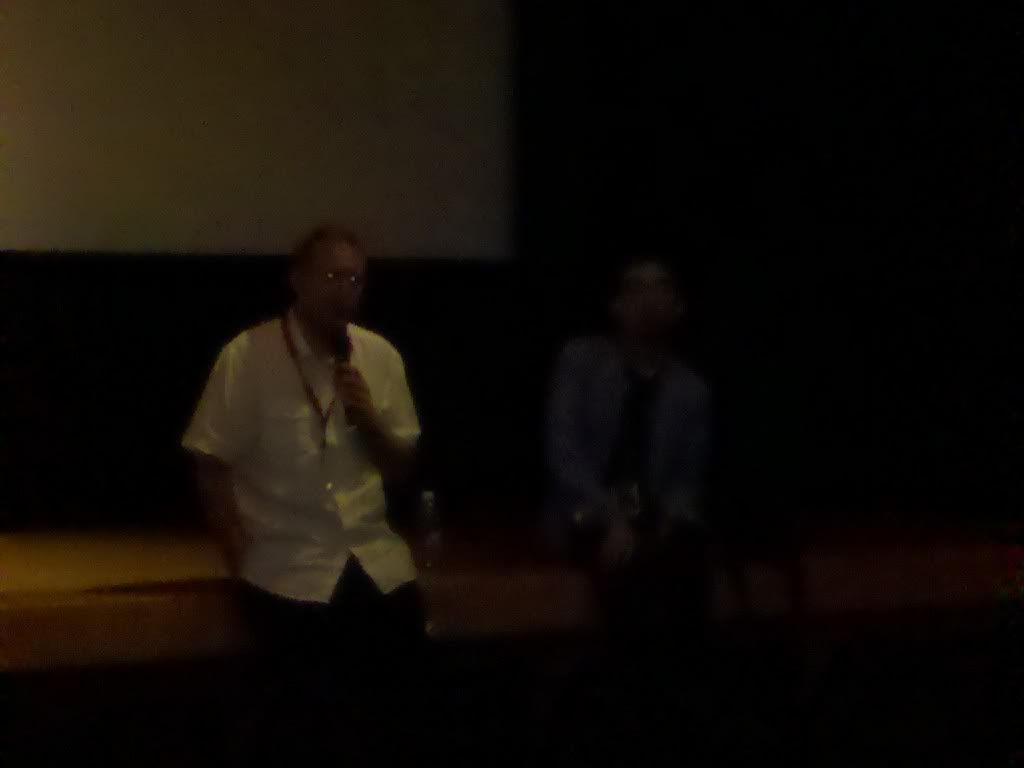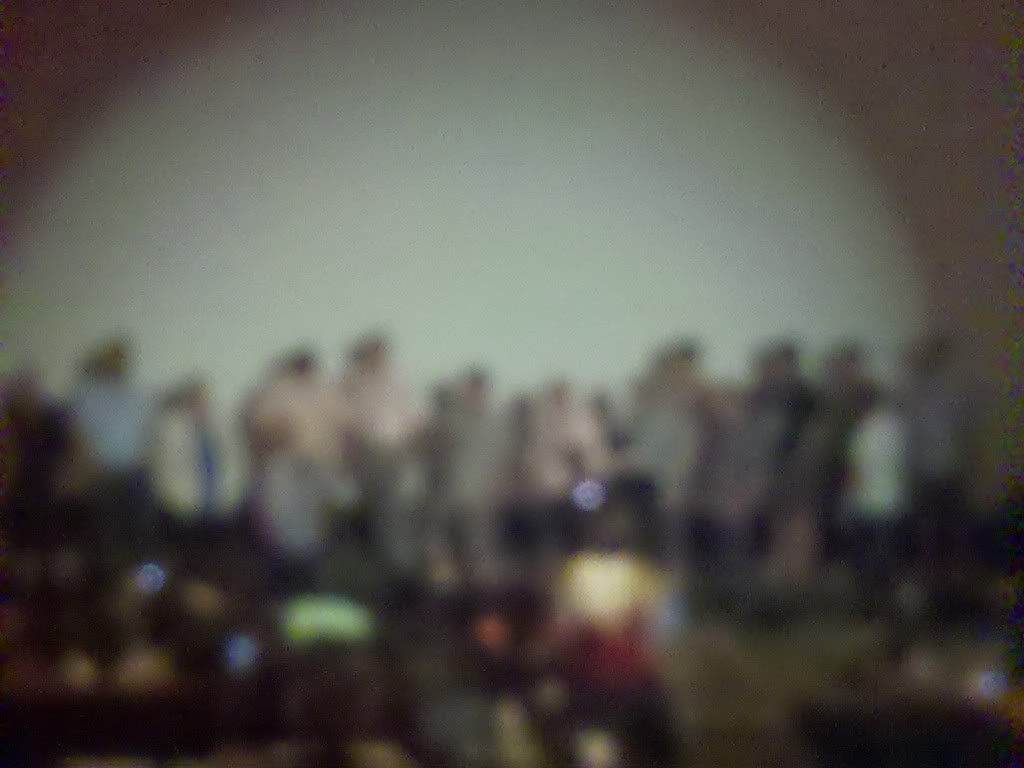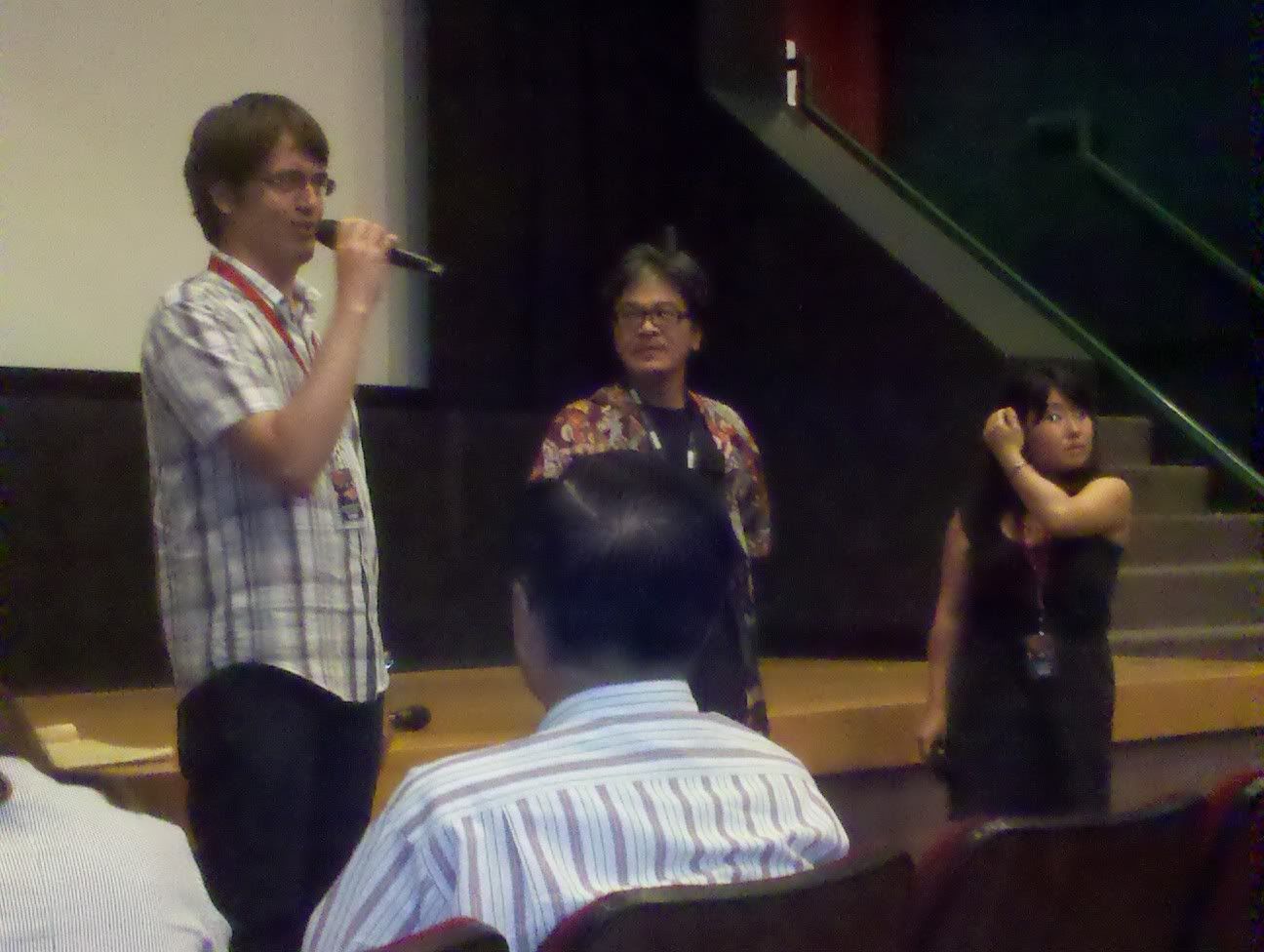
Victims director David Bryant (l). Very friendly and happily willing to spill details about the making and writing of his movie. So many folks guard their secrets so tightly, it was a welcome change to not only hear someone say "we did this, this, and this" or how character moments not made explicit on-screen changed during the drafts.

Cast & crew of Monster Brawl. Yes, it's a Canadian film, and a ton of them were happy to make the trip to Montreal.

Love & Loathing & Lulu & Ayano director Hisayasu Sato. I don't know if I've ever seen a director more excited to be at a film festival. The man was absolutely overflowing with energy, wanting to get pictures with the audience behind him, etc. It's understandable; his previous work has been in various flavors of adult pictures, and this kind of respect and applause was doubtless new to him.
Victims
* * ¾ (out of four)
Seen 23 July 2011 in Salle de Seve (Fantasia 2011 - Playback in Black: The Next Wave)
Victims has as good a stab at making the zero-cut movie work as any, and while it does have a clever idea and some great moments, the shooting gimmick doesn't necessarily do it a lot of favors. The ability to compress time and get multiple angles are some of the most useful tools a filmmaker has, and director David Bryant doesn't get the greatest return on trading them for real-time, first-person immediacy.
"Record everything." That's the order a masked woman (Sarah Coyle) gives to the cameraman just as Chris McMann (John Bocelli) is being snatched off the street an hour before his wedding. She and a masked man (Andy Cresswell) handcuff him to the inside of a van and start off. Chris, they say, was not born with that name, but that of Neil Adams. Twenty years ago, at the age of eleven, this Neil Adams committed a horrible crime, kidnapping, molesting, and murdering a four-year-old girl. They mean to get a confession, and then...
In some ways, Victims has a remarkably tidy set-up; it initially short-circuits the need for there to be any strong evidence of what Chris's abductors claim by letting the audience know that hte film will be focusing on the moment as opposed to the steps needed to get there. Putting the backstory at arm's length also helps make the situation work in the abstract. The movie can't just be about what Chris McCann would or should do in this situation, because even without the accusations, we don't know who Chris McCann is. We have to put ourselves in the characters' shoes (all of them, including and perhaps especially the masked and anonymous ones).
Full review at EFC.
Monster Brawl
* * ½ (out of four)
Seen 23 July 2011 in Theatre Hall (Fantasia 2011)
Monster Brawl is not a bad idea - the fanbases for professional wrestling and monster movies likely have a fair amount of overlap, and the filmmakers clearly have tremendous affection for both. I'm not sure if this particular way of combining the two is movie material, but the affection is contagious.
The particular way of combining them in question is presenting Monster Brawl in the format of a wrestling pay-per-view special, with matches between Cyclops (Jason David Brown) and Witch Bitch (Holly Letkeman), the Mummy (R.J. Skinner) and Lady Vampire (Kelly Couture), the Werewolf (Skinner) and Swamp Gut (Brown), and Zombie Man (Rico Montana) and Frankenstein (Robert Maillet), with the winners of the last two matches squaring off for the heavyweight championship. The action is called by Buzz Chambers (Dave Foley) and "Sasquatch" Sid Tucker (Art Hindle), with Jimmy "The Mouth of the South" Hart (himself) as the ring announcer and MMA official Herb Dean (also playing himself) trying to keep these duels to the death clean.
It's not at all hard to imagine Monster Brawl as a comedy sketch, and in some ways that's what the movie is, the same sketch repeated five times in a row. That's especially obvious when we get to the final match, where we've already seen the combatants' respective gags and the jokes related to the guys in the booth are also getting a bit drawn-out and stale. Before that, at least, writer/director/producer Jesse T. Cook has at least had a bevy of different monster-movie tropes to draw upon and play with by sticking them in the wrestling show format.
And there are, believe it or not, some pretty good bits in there. It's been so long since I watched WWE with any regularity that I still think of it as the WWF, but it's pretty clear that Cook and company know their stuff - the mic work feels exactly right, whether it's characters going off on stream-of-consciousness rants, spoofing that with inarticulate monsters, or some combination of the two. Nearly every regular turn that the audience expects to see on a wrestling card - going at it outside the ring, managers distracting the ref, guys getting hit with folding chairs, etc. - is represented and pumped up a bit for greater absurdity. All that's missing is a "wait - that's ____'s music!" and an ally sprinting to the right from the backstage area. Cook and company nail the tacit understanding that wrestling promotions have with their audiences - everybody knows that the stories are manufactured and the wrestlers are performers more than competitors, but they put just enough effort into the story to give the audience a sense of continuity and context.
Full review at EFC.
Namae no nai onna-tachi (Love & Loathing & Lulu & Ayano)
* * * ¼ (out of four)
Seen 23 July 2011 in Salle de Seve (Fantasia 2011)
I've learned a lot more about the Japanese adult film industry via going to Fantasia than I have any desire to know. It's not intentional - one year a Nikkatsu youth drama retrospective mentions that they specialized in "roman-porno" after that; another features a film, Lalapipo, that spends a lot more time with the characters in that world than the upbeat trailer indicates; others feature ambitious but still softcore "pink eiga". Love & Loathing & Lulu & Ayano is another entry in the second category, and I recommend it on its own. It's just reaching a point where I find myself needing to take longer showers.
Lulu Sakurazawa doesn't exist; the name is just a pseudonym for Junko Ogura (Norie Yasui), a girl recruited off the streets to appear in an adult movie with the promise of "being someone else". It's appealing - she's 22 and cute, but very timid, likely stemming from the promiscuous, bitter mother (Makiko Watanabe) she still lives with. Lulu may be a a cosplay otaku dork, but she can do anything, even make friends with Ayano (Mayu Sakuma), her ex-biker co-star who scares the rest of the set with her anger management problems. There's a limit to how empowering this is, though: Lulu's first fan (Ini Kusano) definitely has stalker potential, Ayano's boyfriend Yuya (Hirofumi Arai) has made a creepy request, and Lulu is starting to take up more and more of Junko's life.
A lot of overtly demeaning and otherwise off-putting things happen on porn sets, but perhaps the most unnerving scene comes early on, as Junko goes shopping for the costume she'll wear in her Lulu persona. This costumed salesgirl comes up to sell her on the fairy wand accessory, and she's just a bit too loud, too committed to her character, and speaking in something that sounds like baby talk. Junk looks a bit startled at first, and there's something even more off-putting than usual about the combined objectification and infantilization of women here. It's a minor theme throughout the rest of the movie, but that moment especially makes anyone in the audience who kind of digs that sort of thing a little complicit as Lulu heads down this road.
Full review at EFC.
Kill Me Please
* * * (out of four)
Seen 23 July 2011 in Salle de Seve (Fantasia 2011)
Here's a weird, but interesting little movie. Dr. Kruger (Aurelien Recoring) runs a clinic in Switzerland, ostensibly for the purpose of helping people commit suicide with dignity. The thing is, he is really no believer in this; his true purpose is to convince the despairing that life is worth living. Sadly, his well-meaning life's work ultimately always seems to lead to failure, as patient after patient eventually opts to end his or her life, no matter how initially reluctant.
This is a pitch-black comedy, with a number of odd characters thrown together in odd ways, given an extra shot of surreality by its black-and-white photography and characters who have a cock-eyed view of things even if they aren't planning to kill themselves. It builds up a heck of steam as it goes, getting both more funny and more philosophical as we learn more about Kruger and his patients.
And then the end... I'm a little torn. On the one hand, it's extremely funny, more outrageous than what had come before and filled with little moments that add up to a really crazed last act. On the other, it does sort of seem to come out of nowhere, like writer/director Olias Barco had no idea how to end the movie without some external force coming in and knocking everything over.
Blackthorn
* * ¾ (out of four)
Seen 23 July 2011 in Salle de Seve (Fantasia 2011)
Also in the "interesting" category, but not quite so entertaining, is Blackthorn, which presents itself as a story of Butch Cassidy's later years, suggesting that he lived in Bolivia for at least twenty years after his supposed death under the name "James Blackthorn", but eventually decided to return to America, unexpectedly finding himself in the middle of one last adventure as a result.
It's not bad - the movie is beautifully shot, and Sam Shepard fits the role of Blackthorn to perfection. The movie itself, though, is deliberately paced and despite its high concept, doesn't seem to have particularly grand or weighty ideas for the audience to contemplate as it goes. There's themes of the call of home and one's potential irrelevance as one ages, but not with particularly special insight.
Batoru rowaiaru (Battle Royale)
* * * ¾ (out of four)
Seen 23 July 2011 in Theatre Hall (Fantasia 2011)
A few weeks ago, my brother's wife was trying to explain why The Hunger Games was worth getting excited about, and I was kind of annoying by responding to each reason with "so... like Battle Royale". Totally unfair of me, as at the time I'd read neither book and hadn't seen this movie. Now that I've at least seen this film, the rest have a lot to live up to.
What I love about it is that director Kinji Fukasaku and his son, screenwriter Kenta Fukasaku, just let it all hang out there. The premise behind the story is loopy - classes of high school students randomly placed on an island and told to fight it out until only one is left alive (and, if there's no "winner" within three days, everybody dies) - and the Fukasakus tke this as license to make everything in the movie just a little larger than life. Or a lot larger than life, as is the case with Takeshi Kitano's murderous, angry teacher who is taking a perverse glee in overseeing the deaths of the entire class who tormented him two years earlier. It's a really fantastic combination of high concept story and gritty action.
Plus, it's got one of the best soundtracks I can remember, especially in the first half. The whole movie is a near-perfect example of really making pulp shine.
No comments:
Post a Comment